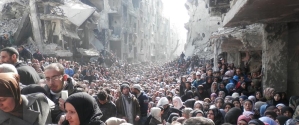
Hundreds of civilians are left dead and thousands of others remain in "immediate danger" and must be rescued from "beyond inhumane" conditions following ISIS' attack on a Palestinian refugee camp near the Syrian capital, a U.N. official said Tuesday.
Over 18,000 refugees, including 3,500 children, are without access to food and water in the Yarmouk camp near Damascus, which for the past several years has been caught between government forces and opposing extremist groups.
However, the already desperate situation in Yarmouk worsened last week when Islamic State forces launched an offensive, overtaking 90% of the camp and clashing with fighters from the al-Qaeda-affiliated Nusra Front and the Free Syrian Army.
Speaking on Tuesday, U.N. Relief and Works Agency spokesman Chris Gunness called the situation in the camp "completely dire," explaining that no U.N. food, water or medical supplies have been able to reach the camp in a week.
"Lives are in immediate danger," he said. " People are holed up in their houses, there is fighting going on in the streets. There are reports of ... bombardments. It is not impossible to work out what needs to be done: we're calling for a pause in the fighting and an evacuation of civilians."
Yarmouk, which was first built for Palestinians fleeing the 1948 Arab-Israeli war, was home to over 150,000 refugees before the Syrian war began nearly five years ago. At the time, the Yarmouk had its own mosques, schools and public buildings. But since 2012, the camp has been beseiged by ongoing fighting and shelling.
In the past five days, as many as 2,000 people have managed to escape the camp and fled towards the capital's Zahira district, which is under control of the Syrian army.
"We were stranded inside our homes, we could hear the exchange of fire. We were really scared," one woman, who fled Yarmouk along with her disabled brother, told the BBC.
"The only solution we faced was either die there or leave the camp, but we managed to escape in a matter of minutes.
She explained that she considers Yarmouk home and all of its occupants as members of her family: "We don't know why we have done to deserve this. We are now displaced once again," she lamented.
Speaking on Monday, the head of the U.N. agency for Palestinian refugees, Pierre Krahenbuhl, told reporters it was "safe to say" that a significant percentage of civilians in the camp are now in the area under the control of armed groups and are experiencing "unbearable suffering," calling the situation "beyond inhumane."
"The situation has been turned upside down. Currently, it's simply too dangerous to access Yarmouk," Krähenbühl added. "Right now, what is on the mind of people at Yarmouk is bare survival."
He urged the U.N. Security Council to "think about" finding a way to evacuate those trapped, acknowledging that doing so would be a "highly complex undertaking" in a "delicate and dangerous" environment."







